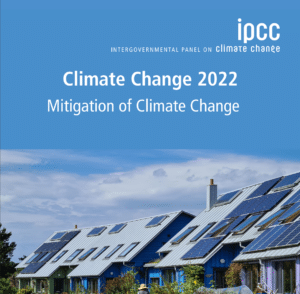Intergovernmental Panel on Climate Change Releases Climate Change Mitigation Report
 Recently, the United Nations Intergovernmental Panel on Climate Change (IPCC) released its third contribution to the sixth assessment report (AR6), not to be confused with the second contribution: Climate Change 2022 report released in February. This portion of the AR6 outlines the rapid and substantial emission reductions needed to limit global warming to 1.5 or 2 degrees Celsius (C), with estimates showing that warming above 1.5C is likely.
Recently, the United Nations Intergovernmental Panel on Climate Change (IPCC) released its third contribution to the sixth assessment report (AR6), not to be confused with the second contribution: Climate Change 2022 report released in February. This portion of the AR6 outlines the rapid and substantial emission reductions needed to limit global warming to 1.5 or 2 degrees Celsius (C), with estimates showing that warming above 1.5C is likely.
This third release for the AR6 follows the publication of the first contribution of AR6, released in August last year, which details how and why the Earth’s climate is changing. The second contribution of AR6 (linked above), released in February, highlights the impacts of climate change and outlines the human causes of climate change.
Key findings in the report include:
- “Global net anthropogenic [greenhouse gas] GHG emissions during the decade (2010-19) were higher than any previous time in human history (high confidence).”
- Although at least 90% of global GHG emissions are covered by climate targets, only 53% are covered by “direct” climate laws.
- Following current climate pledges to 2030 would make it “impossible” to limit warming to 1.5C with “no or limited overshoot” – and “strongly increas[e] the challenge” for 2C.
- “The global economic benefit of limiting warming to 2C is reported to exceed the cost of mitigation in most of the assessed literature (medium confidence).”
- In pathways limiting warming to 1.5C with no or limited overshoot, global CO2 emissions peak “at the latest before 2025” and then fall to 48% below 2019 levels in 2030, reaching net-zero by the “early 2050s”. Global GHGs fall 43% by 2030 and 84% by 2050.
- All scenarios limiting warming to 2C or below include “greatly reduced” fossil fuel use, with unabated coal being “completely” phased out by 2050.
- “The deployment of carbon dioxide removal (CDR) to counterbalance hard-to-abate residual emissions is unavoidable if net-zero CO2 or GHG emissions are to be achieved.”
- Accelerated climate action is “critical” to achieving sustainable development.
A nice summary of the report can be found here.

